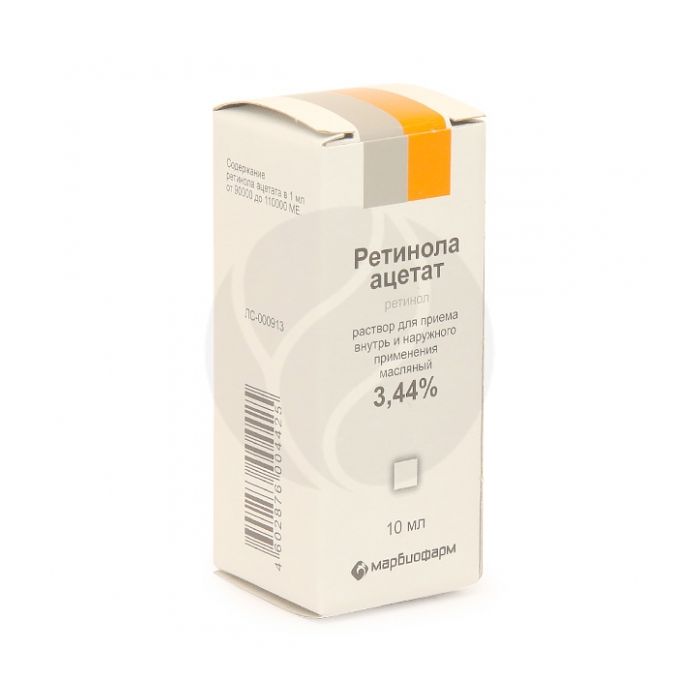Retinol acetate solution 3.44%, 10ml
Expiration Date: 05/2027
Russian Pharmacy name:
Ретинола ацетат раствор 3,44%, 10мл
Administered orally, intramuscularly, externally. Therapeutic doses for mild and moderate avitaminosis: adults - up to 33,000 IU / day, with hemeralopia, xerophthalmia, retinitis pigmentosa - 50,000-100,000 IU / day. During pregnancy and during breastfeeding, the daily dose of retinol is 10,000 IU / day. Children - 1000-5000 IU / day, depending on age. For skin diseases, adults - 50,000-100,000 IU / day, children - 5,000-20,000 IU / day. Oil solutions can also be used externally - for burns, ulcers, frostbite, lubricating 5-6 times / day and covering with gauze; simultaneously use retinol orally or intramuscularly.
retinol acetate 34.4 mg
Gallstone disease, chronic pancreatitis (possible exacerbation of the disease), I trimester of pregnancy.
pharmachologic effect
Vitamin A belongs to the fat-soluble vitamins. It has a manifold effect on the vital activity of the organism. Plays an important role in redox processes (due to the large number of unsaturated bonds), participates in the synthesis of mucopolysaccharides, proteins, lipids. Retinol plays an important role in maintaining the normal state of the skin and epithelium of the mucous membranes, ensuring normal differentiation of epithelial tissue, in the processes of photoreception (contributes to human adaptation to darkness). Retinol is involved in mineral metabolism, cholesterol formation processes, enhances the production of lipase and trypsin, enhances myelopoiesis, cell division processes. Local action is mediated by the presence of specific retinol-binding receptors on the surface of epithelial cells. Inhibits keratinization processes,enhances the proliferation of epithelial cells, rejuvenates cell populations and reduces the number of cells that follow the path of terminal differentiation.
It is believed that retinol has an antitumor effect, which, however, does not apply to non-epithelial tumors.
Indications of the active substances of the drug Retinol acetate
Hypovitaminosis and vitamin deficiency A. Eye diseases (retinitis pigmentosa, hemeralopia, xerophthalmia, keratomalacia, eczematous lesions of the eyelids), diseases and skin lesions (frostbite, burns, wounds, ichthyosis, hyperkeratosis, psoriasis, some forms of eczema and other inflammatory and degenerative pathological processes) ... Complex therapy of rickets, malnutrition, acute respiratory infections, chronic bronchopulmonary diseases, erosive-ulcerative and inflammatory lesions of the gastrointestinal tract, liver cirrhosis. Epithelial tumors and leukemias (in order to increase the resistance of hematopoietic tissue to the action of cytostatics during complex chemotherapy). Mastopathy (as part of a complex of non-hormonal drugs).
Dosage regimen
Administered orally, intramuscularly, externally. Therapeutic doses for mild and moderate avitaminosis: adults - up to 33,000 IU / day, with hemeralopia, xerophthalmia, retinitis pigmentosa - 50,000-100,000 IU / day. During pregnancy and during breastfeeding, the daily dose of retinol is 10,000 IU / day. Children - 1000-5000 IU / day, depending on age. For skin diseases, adults - 50,000-100,000 IU / day, children - 5,000-20,000 IU / day. Oil solutions can also be used externally - for burns, ulcers, frostbite, lubricating 5-6 times / day and covering with gauze; simultaneously use retinol orally or intramuscularly.
Side effect
Hypervitaminosis A: in adults - drowsiness, lethargy, headache, facial flushing, nausea, vomiting, gait disorders, pain in the bones of the lower extremities; in children, fever, drowsiness, sweating, vomiting, skin rashes are possible. Possibly: increased cerebrospinal fluid pressure (hydrocephalus and protrusion of the fontanelle may develop in infants).
Contraindications for use
Gallstone disease, chronic pancreatitis (possible exacerbation of the disease), I trimester of pregnancy.
Application during pregnancy and lactation
Contraindicated in the first trimester of pregnancy.
Application for impaired renal function
Use with caution in acute and chronic nephritis.
Application in children
Application is possible according to the dosage regimen.
special instructions
It is used with caution in acute and chronic nephritis, with decompensation of cardiac activity.
Drug interactions
With simultaneous use with neomycin, a decrease in the absorption of retinol is possible.

